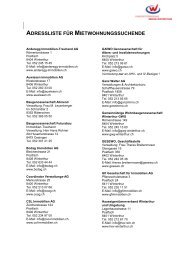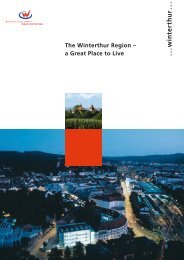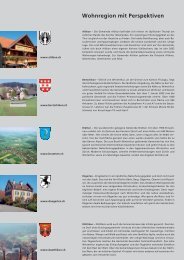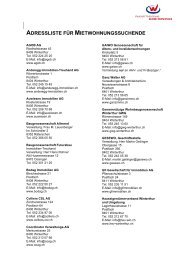Handbook for Investors. Business location in Switzerland.
Handbook for Investors. Business location in Switzerland.
Handbook for Investors. Business location in Switzerland.
You also want an ePaper? Increase the reach of your titles
YUMPU automatically turns print PDFs into web optimized ePapers that Google loves.
6.3.3 Special case: students<br />
The procedure described <strong>in</strong> 6.3.2 also applies to students. The<br />
follow<strong>in</strong>g conditions also apply:<br />
Students who are citizens of EU or EFTA states, the US, Canada,<br />
Australia or New Zealand must generally provide credible proof<br />
that they will not become a welfare case dur<strong>in</strong>g stays of more than<br />
three months (at the relevant Swiss consulate or municipality upon<br />
registration). Students must also prove that they are enrolled at a<br />
recognized school <strong>in</strong> <strong>Switzerland</strong> and will be attend<strong>in</strong>g general<br />
<strong>in</strong>struction classes or a program prepar<strong>in</strong>g them <strong>for</strong> a profession.<br />
If these requirements are met, the student will receive a residence<br />
permit <strong>for</strong> the duration of their studies or <strong>for</strong> the period of one<br />
year if their studies last longer than one year. The permit will be<br />
extended until the student has received a regular degree if the<br />
requirements <strong>for</strong> the permit cont<strong>in</strong>ue to be met.<br />
Students who are not citizens of EU or EFTA member states, the<br />
US, Canada, Australia or New Zealand must also <strong>in</strong>clude the follow<strong>in</strong>g<br />
documents together with their personal entry application,<br />
which they submit to the relevant Swiss consulate:<br />
• Letter of acceptance from the school<br />
• Proof of payment of tuition<br />
• Proof of sufficient f<strong>in</strong>ancial fund<strong>in</strong>g <strong>for</strong> liv<strong>in</strong>g expenses <strong>for</strong> the<br />
duration of the course of study<br />
• Diplomas/school certificates<br />
• Written agreement to leave <strong>Switzerland</strong> after completion of<br />
studies<br />
• Additional sheet document<strong>in</strong>g language proficiency. Language<br />
proficiency is judged based on a short <strong>in</strong>terview at the consulate.<br />
The Swiss consulate sends the entry application, <strong>in</strong>clud<strong>in</strong>g<br />
documentation and assessment of language proficiency, to the<br />
relevant cantonal migration authorities <strong>for</strong> their approval.<br />
6.4 Resid<strong>in</strong>g <strong>in</strong> <strong>Switzerland</strong> with<br />
ga<strong>in</strong>ful employment.<br />
People work<strong>in</strong>g <strong>in</strong> <strong>Switzerland</strong> dur<strong>in</strong>g their stay <strong>in</strong> the country or<br />
people stay<strong>in</strong>g <strong>for</strong> more than three months need a permit from<br />
the cantonal migration office. A dist<strong>in</strong>ction is made between short<br />
stays (less than one year), temporary stays (of limited duration)<br />
and permanent stays (of unlimited duration).<br />
The employer is responsible <strong>for</strong> obta<strong>in</strong><strong>in</strong>g a work permit from the<br />
cantonal migration office.<br />
S<strong>in</strong>ce the <strong>in</strong>troduction of the bilateral agreements on the free<br />
movement of persons and the revised EFTA convention, different<br />
conditions have applied to EU/EFTA nationals than to people from<br />
other countries. EU/EFTA citizens are on equal foot<strong>in</strong>g with Swiss<br />
employees.<br />
Other countries are subject to immigration restrictions and the<br />
rule of priority <strong>for</strong> Swiss nationals. Foreign asylum seekers may<br />
stay <strong>in</strong> <strong>Switzerland</strong> <strong>in</strong> accordance with the provisions of asylum<br />
legislation.<br />
The cantons are responsible <strong>for</strong> decid<strong>in</strong>g on whether <strong>for</strong>eigners<br />
may stay and reside <strong>in</strong> the country. However, the federal government<br />
has the right of veto. The cantonal migration authorities are<br />
responsible <strong>for</strong> alien control. Foreigners must register with the<br />
Residents Registration Office <strong>in</strong> the municipality <strong>in</strong> which they<br />
reside with<strong>in</strong> eight days.<br />
For anyone <strong>in</strong>tend<strong>in</strong>g to relocate to <strong>Switzerland</strong>, it can be advantageous<br />
to bundle the permit applications and to discuss them<br />
be<strong>for</strong>ehand. The cantonal economic development agencies provide<br />
advice on how to proceed and how long the process takes.<br />
<strong>Handbook</strong> <strong>for</strong> <strong>Investors</strong> 2010<br />
53









